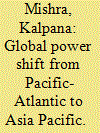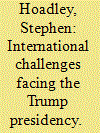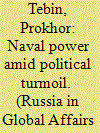| Srl | Item |
| 1 |
ID:
151133


|
|
|
|
|
| Summary/Abstract |
Global power shifts are strategically and politically significant. It tends to displace or restructure existing international order. The global strategic, political and financial structures have been dominated by the U.S. and Europe. Asia remained dominated by European colonization for two centuries and was there after dominated by the U.S. strategically for one more century. Asia’s economic resurgence and cumulative financial strengths over the last two decades have substantially contributed to the global shift of power to Asia.
|
|
|
|
|
|
|
|
|
|
|
|
|
|
|
|
| 2 |
ID:
151251


|
|
|
| 3 |
ID:
099574


|
|
|
| 4 |
ID:
132715


|
|
|
|
|
| Publication |
2014.
|
| Summary/Abstract |
The World Ocean is a key space for international relations and military policies of the great powers. It depends only on Russia whether it becomes an active player in this space or a passive observer. Naval power in the 21st century will probably play a greater role in foreign policies of maritime nations than in the 20th century. The 70/80/90 rule from the present U.S. naval strategy has already entered into wide use. This rule means that 70 percent of the Earth's surface is covered with seas and oceans, 80 percent of people live along coasts, and 90 percent of all world goods travel on the ocean. The world ocean is a source of an increasing number of conflicts and threats to international, regional and national security. Symbolically, the Ukrainian crisis, the most serious challenge for Russia's foreign policy in recent years, is directly related to the naval power issue. This article discusses in this context the strategic situation in the world ocean, relations among maritime nations, and some aspects of Russia's naval activities in the medium and long term.
|
|
|
|
|
|
|
|
|
|
|
|
|
|
|
|
| 5 |
ID:
089725


|
|
|
|
|
| Publication |
2009.
|
| Summary/Abstract |
Pakistan's compaign of terror against India was never condemned by the US in the terms that would have required Pakistan to change its ways. Taking all this into consideration, it would be wise to treat the US's current interest in India as rising out of compulsions of its own national interests and no more.
|
|
|
|
|
|
|
|
|
|
|
|
|
|
|
|